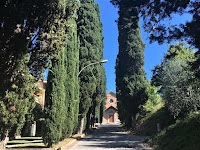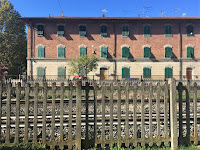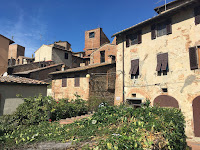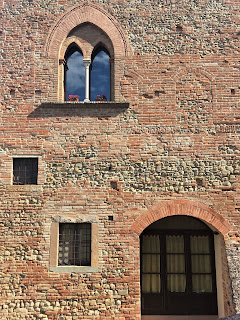In the morning I went downstairs for the breakfast, where I met the head of the family Simona. There was a long conversation with the hostess on unknown to me Italian language, and I hardly could understand a word in her speech. But she was so natural and emotional, that I fall in love with that woman and all Italians as the nation. Another time I come to conclusion that staying at the local's house as a guest is the right choice while travelling abroad, because in that case you would have a chance to see ordinary people, to hear amusing stories, to get valuable tips and to experience genuine emotions.
Several facts from Simona I learnt very well. First, the Italian people prefer coffee not from the espresso machine, but from the geyser coffee maker, which originally was designed in Italy in 1933 ('la moka' in Italian). Second, cappuccino is being drunk only in the morning. Third, they call Americano not coffee with lots of hot water, but coffee with volume of double espresso. Lastly, my favourite Italian biscuits Cantucci are eaten not with coffee, as I thought before, but with the dessert wine, into which they are usually dunked.
Simona also told me about the nearby places, which, in her opinion, I should visit by all means. One of such places is the small village of Vinci, famous for being the birthplace of Leonardo da Vinci (1452). Unfortunately, Vinci is not accessible by train, so I headed for the city of Certaldo, which is more convenient to reach.
On the way to the railway station I took time to observe the area of my temporary staying. In fact, my village is a really small and quite boring for young people community. One church, one cultural centre for the pensioners, one supermarket and a train station without a ticket machine are the only public places here. I even have not detected any restaurant here.
On the way to the railway station I took time to observe the area of my temporary staying. In fact, my village is a really small and quite boring for young people community. One church, one cultural centre for the pensioners, one supermarket and a train station without a ticket machine are the only public places here. I even have not detected any restaurant here.
In 10 minutes by train I have arrived to Certaldo.
The town of Certaldo is divided into an upper medieval part called Certaldo Alto, surrounded by fortified walls, and a modern part located in the valley below. Of course, I was more interested in the historical part, and I headed straight to the hill.
By the way, the name Certaldo originates from Latin, “altura ricoperta di cerri” and refers to a hilltop covered in trees.
It is possible to access the old centre by climbing up the steep streets costa Alberti and costa Vecchia, from the more modern via del Castello, or by using the funicular railway that leaves from piazza Boccaccio. I have decided to save money and to perform a nice steeply walk.
Unlike many towns which are built around a main square, the limited space on the hilltop of Certaldo forced the town to grow along the main road, which is known today as Via Boccaccia. These days the main road serves as the stage where many of the historical reconstructions, folkloric events, markets, and town dinners take place.
The most remarkable building of Certaldo is the Palazzo Pretorio (or Palazzo of the Vicariato), and it is situated on the higher point of the hill of Certaldo.
In fact, the Palace was constructed in the 12th century, and it became the residence of the Florentine governors. On the facade of the Palace there are placed various coats of arms in marble, stone and ceramics. Them represent the families of the governors who were in the government of Certaldo. The largest coat of arms in the center of the facade is the Medici's.
In fact, the Palace was constructed in the 12th century, and it became the residence of the Florentine governors. On the facade of the Palace there are placed various coats of arms in marble, stone and ceramics. Them represent the families of the governors who were in the government of Certaldo. The largest coat of arms in the center of the facade is the Medici's.
The Palace also encloses the interesting series of rooms where you can admire frescoes from the 15th and 16th centuries.
Certaldo is connected with the name of Giovanni Boccaccio, one of the greatest Italian writers and poets. He was also recognized as the Renaissance humanist, scholar of classical literature, a friend of Petrarch and a great fan of Dante. However, most people know him primarily as the author of the tales series "Decameron", written between 1349 and 1351.
Boccaccio spent in Certaldo the last years of his life in a house, which can be visited today as a museum. He was buried in Certaldo in 1375.
Still, even if you are not interested in the name of Boccaccio and his heritage, his house is worth entering simply because of the grand view from the tower, which you can climb while visiting the museum.
Next door to the palazzo stands the church of San Tommaso e Prospero, dating to the 13th century. But today it is occupied by the wine festival, which is holding in the town these days. Actually, it is called Boccaccesca, and it takes place the first two weekend in October. The purpose of this food festival is celebrating the local food traditions. As a matter of fact, Certaldo is also famous for the red onion, the white truffles and an excellent Extra Virgin Olive Oil, so you can try them together with other delicacies of the Tuscan gastronomy at this event. Moreover, it is an unique opportunity to taste good quality wine directly from the producer. This evening I have glassed Oblio wine from Poggio delle Civette company, and there were both variants - simple and superior one.
After tasting superior wine I left the church and looked at the beautiful colours of the pre-sunset sky. At some moment I understood how 'dolce vita' feels like and why Tuscany could inspire many famous local people for their great achievements.
I was back home late at the evening. A little bit tired, but absolutely satisfied with everything I have seen and experienced today. Hardly can I imagine if the land of Tuscany may offer something better.



































No comments:
Post a Comment